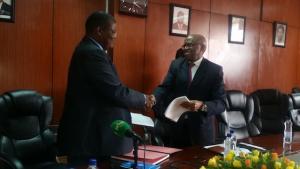WHO Country Office signs a financing agreement with African Development Bank (ADB) on leveraging mobile technology to improve access to basic health services
Lusaka, June 6, 2016 – On 19th May 2016, the World Health Organisation Country Office signed a financing agreement with the African Development Bank (ADB) on leveraging mobile technology to improve access to basic health services in Zambia. Through this agreement, the ADB will provide WHO a grant amounting to US$ 385,000 to support the Ministry of Health in implementation of the Mhealth initiative. The Mhealth programme is a component of a global WHO-International Telecommunications Union (ITU) joint initiative, Mobile Health for NCDs whose aim is to harness mobile technology to improve prevention and treatment of Non– communicable diseases (NCDs).
Speaking at the signing ceremony, the Director for Disease Surveillance, Control and Research at Ministry of Health Dr. Elizabeth Chizema thanked the African Development Bank and WHO for partnering to make available funding to support implementation of the Mhealth programme. She said that the Ministry of Health “Be Healthy, Be Mobile” will create a platform that enables the integration of mobile technology into the health delivery system, and facilitate government efforts to address NCD with an immediate focus on cancer. . “Cervical cancer is the most frequent cancer in Zambia among the adult population and accounts for 30% of new cases of cancers and Zambia has one of the highest incidence and mortality rates of cervical cancer in the world” she said.
The WHO Representative Dr. Jacob Mufunda stated that E-health provides a new medium for information dissemination, and interaction among institutions, health professionals, health care providers and the public. He said that the Health in Zambia was targeting diabetes, hypertension, cancers and respiratorychronic respiratory diseases, however, it is important to extend its use to other NCDS.
Mr. Damoni Kitabire, Resident Representative, African Development Bank, said that the funding to the Mhealth was in line with one of the priorities of the ADB, that of improving the quality of life of African people through investing in areas such as health and education. He said the his organization was providing the grant in order to promote partnerships because WHO has a comparative advantage and ability to deliver on health.
The objectives of the mhealth programme are in line with the priorities of the government which are to: provide cost-effective, quality health coverage to all; increase ICT innovation and infrastructure and to increase access to advanced referral medical care services to ensure an effective, efficient continuity of care. Since the cervical cancer screening programme started in 2006, over 350,000 women have been screened since inception at least once in their lifetime. Close to 30,000 adolescent girls have been fully vaccinated against HPV infection and cervical cancer and over 12,000 patients have received treatment at the Cancer Diseases Hospital. Cancer screening clinics have been made available in each province in Zambia and over 300 health workers have been trained trained in cervical cancer screening. The MOH is transitioning screening sites from cooperating partners to full ownership of the government.
____________________________________
For More Information Contact:
Nora Mweemba, Health Information and Promotion Officer.
E-mail: mweemban [at] who.int, Tel No:00-260-211-255 398 / 255 336 / 255 322, Fax: 00-260-211-252863
Dr. Peter Songolo, Disease Prevention and Control Officer, E-mail: songolop [at] who.int, Tel: 00-260-211-255 398 / 255 336 / 255 322, Fax: 00-260-211-252863




